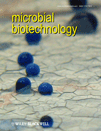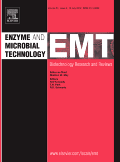
Current Research in Biotechnology
Scope & Guideline
Unveiling Innovations in Biotechnology Today
Introduction
Aims and Scopes
- Biodiversity and Environmental Biotechnology:
The journal emphasizes the exploration of microbial and plant biodiversity, particularly in the context of bioremediation and sustainable practices. Studies often focus on the utilization of microorganisms and plants to detoxify contaminated environments and enhance soil health. - Biopharmaceuticals and Therapeutics:
A core area of focus includes the development of biopharmaceuticals, including therapeutic proteins, vaccines, and antimicrobial agents. Research often involves the design, synthesis, and evaluation of novel compounds and their mechanisms of action. - Food Biotechnology and Safety:
The journal covers advancements in food biotechnology, including the use of probiotics, food safety assessments, and the development of functional foods. This includes research on bioactive compounds from natural sources and their potential health benefits. - Synthetic Biology and Genetic Engineering:
Current Research in Biotechnology places significant emphasis on synthetic biology and genetic engineering, exploring innovative techniques for the modification of organisms to produce valuable products, including biofuels, enzymes, and pharmaceuticals. - Nanobiotechnology and Biosensors:
Research on nanotechnology applications in biotechnology, including the development of biosensors for environmental monitoring and healthcare diagnostics, is a recurring theme, showcasing the integration of nanotechnology with biological systems.
Trending and Emerging
- Artificial Intelligence and Machine Learning in Biotechnology:
A significant trend is the incorporation of AI and machine learning techniques to analyze biological data, enhance predictive modeling, and optimize bioprocesses, indicating a shift towards data-driven research methodologies. - Microbiome Research and Applications:
There is an increasing focus on the role of microbiomes in health, agriculture, and environmental sustainability. Research is exploring how microbial communities can be harnessed for innovative applications, including bioremediation and human health. - Sustainable Biotechnology Practices:
Emerging themes include sustainability in biotechnological processes, with research highlighting waste valorization, biofuel production from renewable resources, and the development of eco-friendly bioproducts. - Advanced Drug Delivery Systems:
Research on novel drug delivery systems, particularly those utilizing nanotechnology and biocompatible materials, is gaining traction, reflecting a need for improved therapeutic efficacy and safety in pharmaceutical applications. - Integrative Approaches in Biomanufacturing:
The trend towards integrating various biotechnological approaches, such as combining synthetic biology with traditional fermentation technologies, is emerging, showcasing the potential for innovative production methods.
Declining or Waning
- Traditional Agricultural Biotechnology:
There has been a noticeable decrease in research focused solely on traditional methods of agricultural biotechnology, such as conventional genetic modification techniques, as the field shifts towards more advanced approaches like CRISPR and synthetic biology. - Single-Domain Microbial Studies:
Research that focuses exclusively on single microbial strains or species without considering broader ecological interactions is becoming less common, as there is a growing recognition of the importance of microbiome studies and community dynamics. - Static Models in Biotechnology Applications:
The use of static models in biotechnological research is declining, with a preference for dynamic, system-based approaches that better reflect the complexities of biological systems and their interactions with environmental factors.
Similar Journals

Microbial Biotechnology
Advancing microbial innovation for a sustainable future.Microbial Biotechnology, published by WILEY, stands at the forefront of innovation in the field of applied microbiology and biotechnology, showcasing cutting-edge research and advancements within both academic and industrial contexts. As an Open Access journal since 2012, it ensures that high-quality research is easily accessible to researchers, professionals, and students globally, promoting knowledge sharing and collaboration. With an impressive impact, the journal holds a Q1 ranking in its categories—Applied Microbiology and Biotechnology, Biochemistry, Bioengineering, and Biotechnology—demonstrating its significance in the scientific community. The journal currently boasts a strong Scopus ranking in several relevant disciplines, including a top 10% position in Applied Microbiology and Biotechnology, highlighting its critical role in disseminating influential findings. Designed to foster dialogue and advance technology within the microbial sciences, Microbial Biotechnology is an essential resource for anyone committed to leveraging microbial processes for sustainable and innovative solutions.

PROCESS BIOCHEMISTRY
Pioneering insights in process biochemistry since 1950.PROCESS BIOCHEMISTRY is a premier journal published by Elsevier Science Ltd, dedicated to advancing the field of biochemistry, microbiology, and bioengineering. With an ISSN of 1359-5113 and an E-ISSN of 1873-3298, this renowned journal is recognized for its impactful contributions, as demonstrated by its Q2 ranking in Applied Microbiology and Biotechnology, Biochemistry, and Bioengineering categories as of 2023. Covering a wide array of topics since its inception in 1950, PROCESS BIOCHEMISTRY serves as a crucial platform for researchers and professionals to disseminate innovative findings and develop new insights in enzyme technology, metabolic pathways, and bioreactor design. Although the journal operates under a non-open access policy, it remains vital for those engaged in cutting-edge biochemical research and development. Located in the United Kingdom, it continues to facilitate scientific discourse and foster collaboration among industry experts and academic scholars worldwide.

BIOSYSTEMS ENGINEERING
Pioneering advancements for a sustainable tomorrow.BIOSYSTEMS ENGINEERING, published by Academic Press Inc. Elsevier Science, is a leading journal that has established itself as a key contributor in the fields of agronomy, crop science, animal science, food science, soil science, and control systems engineering. With an impressive position in the 2023 Category Quartiles, featuring Q1 rankings in Agronomy and Crop Science, Animal Science and Zoology, Food Science, and Soil Science, alongside a Q2 ranking in Control and Systems Engineering, this journal stands at the forefront of innovative research. Currently indexed in Scopus, it boasts a commendable track record, with its Agricultural and Biological Sciences rankings placing it in the 95th percentile for Agronomy and Crop Science and the 90th percentile for Soil Science, among others. With a commitment to disseminating critical advancements and fostering scientific dialogue, BIOSYSTEMS ENGINEERING offers an invaluable platform for researchers, professionals, and students alike, seeking to advance their understanding and application of engineering principles in biological systems. As a hybrid journal that provides both subscription and open access options, it ensures broad accessibility to high-quality research that shapes the future of sustainable agriculture and biological systems.

Biotechnology and Genetic Engineering Reviews
Elevating Research Standards in Biotechnology and Genetic Engineering.Biotechnology and Genetic Engineering Reviews is a prominent journal published by Taylor & Francis Ltd, specializing in the rapidly evolving fields of biotechnology and genetic engineering. Since its inception in 1984, this journal has served as a critical platform for researchers and professionals to disseminate groundbreaking scientific findings, review methodologies, and discuss emerging trends within the domain. With a substantial track record of convergence in its publication history from various years, it currently holds Q2 rankings in both Bioengineering and Biotechnology, alongside a Q3 ranking in Molecular Biology for 2023. Its dedication to quality research is reflected in its Scopus rankings, which position the journal favorably within the competitive landscape of biochemistry and molecular biology. Although it is not an open-access journal, Biotechnology and Genetic Engineering Reviews remains committed to providing accessible insights to the global scientific community, making it an invaluable resource for students, academics, and industry professionals keen on advancing their knowledge in these crucial fields.

Research Journal of Biotechnology
Advancing biotechnology through impactful research.Research Journal of Biotechnology is a premier publication dedicated to advancing the field of biotechnology through the dissemination of impactful research articles. Published by Research Journal Biotechnology in India, this journal operates under an Open Access model, facilitating unrestricted access to high-quality research for researchers, professionals, and students worldwide. With an ISSN of 2278-4535 and an E-ISSN of 2278-4535, the journal aims to serve as a comprehensive platform for innovative studies in Applied Microbiology and Biotechnology, Bioengineering, and Biotechnology. Despite its current Q4 quartile ranking in these categories, the journal aspires to extend its influence and visibility in the academic community, aiming for greater impact in the future. The journal features research articles that span a wide array of topics in biotechnology, fostering a collaborative and knowledge-rich environment for national and international scholars. We invite you to explore, contribute to, and engage with the expanding landscape of biotechnological research through the Research Journal of Biotechnology.

Izvestiya Vuzov-Prikladnaya Khimiya i Biotekhnologiya
Innovating Solutions for a Sustainable FutureIzvestiya Vuzov-Prikladnaya Khimiya i Biotekhnologiya, published by Irkutsk National Research Technical University, is a prominent open-access journal dedicated to advancing the fields of applied chemistry and biotechnology. Since its inception in 2011, this journal has provided a platform for the dissemination of significant research findings, innovative techniques, and technological advancements that bridge the gap between theoretical frameworks and practical applications. The journal is indexed in various databases, ensuring that published works reach a global audience of researchers, professionals, and students eager to explore the latest developments in these critical disciplines. With its commitment to open-access publishing, Izvestiya Vuzov-Prikladnaya Khimiya i Biotekhnologiya plays a vital role in fostering collaboration and knowledge sharing within the scientific community, thus contributing to the advancement of both fields in a rapidly evolving technological landscape.

BIOTECHNOLOGY ADVANCES
Exploring Tomorrow's Biotechnological BreakthroughsBIOTECHNOLOGY ADVANCES is a premier, peer-reviewed journal published by PERGAMON-ELSEVIER SCIENCE LTD, dedicated to advancing knowledge in the rapidly evolving fields of biotechnology and bioengineering. With an ISSN of 0734-9750 and an E-ISSN of 1873-1899, this esteemed journal covers a wide spectrum of topics relevant to applied microbiology, molecular biology, and biochemical innovation. Recognized for its academic rigor, it holds a distinguished position in the top quartile (Q1) in multiple categories, including Applied Microbiology and Biotechnology, Bioengineering, and Biotechnology, further evidenced by its high rankings in Scopus, where it ranks #3/127 in Applied Microbiology and Biotechnology and #7/311 in Biotechnology. Researchers and professionals in the field value the journal not only for its comprehensive coverage of cutting-edge research but also for its commitment to disseminating critical findings and fostering collaboration. While BIOTECHNOLOGY ADVANCES currently operates under a subscription model, its potential impact on future innovations in biotechnology cannot be overstated, making it an essential resource for anyone interested in the forefront of biotechnological advancements.

BIOTECHNOLOGY LETTERS
Transforming Ideas into Impactful Biotechnological SolutionsBIOTECHNOLOGY LETTERS is a prestigious peer-reviewed journal that has been at the forefront of biotechnology research since its inception in 1979. Published by Springer, this esteemed journal serves as a vital platform for disseminating cutting-edge research in the fields of applied microbiology, bioengineering, and biotechnology, with a focus on innovative methodologies and technologies. With an impact factor reflecting its critical contribution to the discipline, BIOTECHNOLOGY LETTERS resides in the Q2 and Q3 tiers of various scientific categories, placing it among the notable journals in the biotechnological landscape. Although it offers traditional access options and does not feature open access, the journal embraces a global readership, encouraging submissions from researchers, professionals, and students eager to explore the dynamic advancements in biotechnology. Situated in the Netherlands, it continues to shape the future of the field through relevant, impactful research that addresses contemporary challenges and opportunities in medicine and beyond.

ENZYME AND MICROBIAL TECHNOLOGY
Advancing Knowledge at the Intersection of Microbiology and BiochemistryENZYME AND MICROBIAL TECHNOLOGY, a premier journal published by Elsevier Science Inc, serves as a pivotal platform for researchers and professionals dedicated to exploring the dynamic intersections of microbiology, biochemistry, and bioengineering. With a rich publication history dating back to 1979 and converging until 2024, this journal has established itself within the Q2 quartile rankings across multiple categories, including Applied Microbiology and Biotechnology, Biochemistry, Bioengineering, and Biotechnology, highlighting its influential role in advancing scientific discourse. It holds impressive Scopus rankings, where it is recognized in the 79th percentile for Applied Microbiology and Biotechnology and ranks favorably in related fields, making it a valuable resource for academic and industrial researchers looking to stay abreast of the latest developments. Although it does not currently offer Open Access options, ENZYME AND MICROBIAL TECHNOLOGY remains an essential read for anyone invested in the biotechnological applications of enzymes and microorganisms.

CRITICAL REVIEWS IN BIOTECHNOLOGY
Advancing the Frontiers of Biotechnology KnowledgeCRITICAL REVIEWS IN BIOTECHNOLOGY, published by Taylor & Francis Ltd, stands as a leading journal in the field of biotechnology, consistently recognized for its rigorous peer-reviewed articles that impact the disciplines of Applied Microbiology, Biotechnology, and Medicine. With an impressive Q1 ranking in these categories and a significant influence reflected in its Scopus rankings—placing it within the top 5% of Applied Microbiology and the top 4% of Biotechnology journals—the journal serves as an essential resource for researchers, professionals, and students alike. Launched in 1983 and extending its coverage to encompass groundbreaking findings through 2024, it provides a rich forum for insightful reviews and innovative research that propel the field forward. Though not an Open Access journal, CRITICAL REVIEWS IN BIOTECHNOLOGY remains a vital point of reference for ongoing developments, critical analyses, and emerging trends, making it indispensable for those seeking to stay at the forefront of biotechnological advancements.